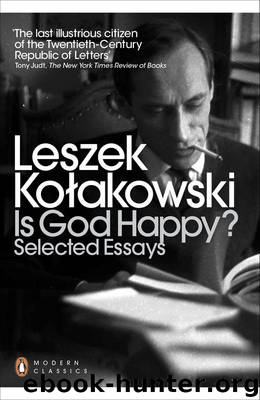Is God Happy?: Selected Essays (Penguin Modern Classics) by Leszek Kolakowski

Author:Leszek Kolakowski
Language: eng
Format: azw3
ISBN: 9780141389578
Publisher: Penguin Books Ltd
Published: 2012-10-31T22:00:00+00:00
Leibniz and Job:
The Metaphysics of Evil and the Experience of Evil
To review human reflection about evil is to review the entire history of theology, philosophy, religion and literature, from the Rig Veda to Plato to Dostoyevsky to Wittgenstein. And to consider the effective operations of evil in human life is to consider the whole history of mankind, from paleolithic tribes to twentieth-century man.
There are two ways – each of them with a number of variants – that philosophers, theologians, scholars, scientists and ordinary people have tried, throughout the centuries, to cope with the so-called problem of evil. As with all important human issues, we can try either to solve the ‘problem’ or to get rid of it altogether by declaring it invalid: by denying that the problem exists. Among those who have tried to tackle the problem we find adherents of two fundamentally opposed (or so it seems) metaphysics: Manichaeans and Christians. Among those who have denied the validity of the problem – though not all of them for the same reason – there are some mystics, some pantheists, all Marxists and communists, most other utopians, and most advocates of a naturalistic worldview, like Nietzscheans, Nazis and philosophical Darwinists.
It is trivially true that the concept of evil as pure negativity is a simple deduction from the belief in a creator who is both unique and infinitely good, so that whatever is, is good necessarily, and existence as such is good. This, to repeat, is a logical deduction, not a matter of experience. But it is mostly through such arguments that Christian theodicy has made its enormous, indeed heroic, efforts to respond to the most common experience of ordinary people – the experience of evil. When St Augustine says that the very presence of evil must be good because if it were not, God would not have allowed evil to appear, he is stating something that is obvious in Christian terms. This, again, is a logical deduction from the concept of God; it implies that God could, if He wanted, prevent evil from appearing, but for reasons best known to Himself preferred to let it stay.
Leibniz is more specific in explaining what those reasons may have been. He, too, does so by deduction. Having proved the necessary existence of God and, separately, His supreme goodness, Leibniz inferred from these that God must have created the best world that is logically conceivable, and that this is the world we inhabit; any other world would be worse.
Voltaire’s famous derision of this idea is too easy. Leibniz was well aware of the horrors of life. Nevertheless, belief in the supreme goodness of creation is irresistible given such an idea of the divine being. And it implies that God, in His all-embracing wisdom, must have solved, as it were, an equation in an infinitely complex higher calculus in order to calculate which world would produce the maximum goodness. Christian tradition has always stressed, after Plato, the distinction between moral evil and suffering: moral evil –
Download
This site does not store any files on its server. We only index and link to content provided by other sites. Please contact the content providers to delete copyright contents if any and email us, we'll remove relevant links or contents immediately.
The remains of the day by Kazuo Ishiguro(9002)
Tools of Titans by Timothy Ferriss(8402)
Giovanni's Room by James Baldwin(7350)
The Black Swan by Nassim Nicholas Taleb(7136)
Inner Engineering: A Yogi's Guide to Joy by Sadhguru(6798)
The Way of Zen by Alan W. Watts(6619)
The Power of Now: A Guide to Spiritual Enlightenment by Eckhart Tolle(5788)
Asking the Right Questions: A Guide to Critical Thinking by M. Neil Browne & Stuart M. Keeley(5778)
The Six Wives Of Henry VIII (WOMEN IN HISTORY) by Fraser Antonia(5518)
Astrophysics for People in a Hurry by Neil DeGrasse Tyson(5193)
Housekeeping by Marilynne Robinson(4453)
12 Rules for Life by Jordan B. Peterson(4308)
Ikigai by Héctor García & Francesc Miralles(4277)
Double Down (Diary of a Wimpy Kid Book 11) by Jeff Kinney(4275)
The Ethical Slut by Janet W. Hardy(4261)
Skin in the Game by Nassim Nicholas Taleb(4253)
The Art of Happiness by The Dalai Lama(4132)
Skin in the Game: Hidden Asymmetries in Daily Life by Nassim Nicholas Taleb(4009)
Walking by Henry David Thoreau(3966)
